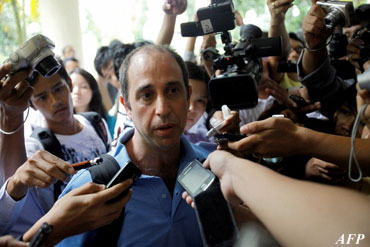UN Special Rapporteur on Human Rights in Myanmar Tomás Ojea Quintana on Wednesday expressed concern at the Rakhine Commission’s lack of recommendations to address impunity and ensure investigations into “credible allegations of widespread and systematic human rights violations targeting the Muslim community in Rakhine State.”

He did, however, welcome “some forward-thinking recommendations” by the Investigation Commission, which submitted its report earlier this week into communal violence between Rakhine Buddhists and members of the Muslim Rohingya community in Myanmar’s western Rakhine State last year which left at least 200 dead and 140,000 homeless.
“There are important recommendations on addressing the dire humanitarian situation in the Muslim camps for internally displaced people (IDP), including overcrowding, access to clean water and sanitation, the risk of disease, food security and child malnutrition, as well as on improving access to education and livelihoods,” he said.
“However, in implementing them, I urge the authorities, as a matter of urgency, to ease the harsh and disproportionate restrictions on the freedom of movement of Muslim populations in the IDP camps and also in Muslim residential areas, such as Aung Mingala in Sittwe and across northern Rakhine State, while also providing adequate security,” the senior UN representative said.
Quintana famously quipped that, during a visit to a Rohingya IDP camp in Myebon, it “felt more like a prison than an IDP camp.”
The Special Rapporteur praised the reports’ recommendations on building communication, trust and understanding between different religious and ethnic communities in Rakhine State, including through community and interfaith dialogues, and through the use of public service broadcasting.
“The recommendation to establish a Task Force composed of moderate leaders from both communities is just the kind of mechanism that is needed to ensure systematic dialogue between communities, which could play an essential role in rebuilding trust and finding solutions at the local level,” he said. “Dr. Tun Aung is one such leader who I hope to see released from Sittwe Prison soon and appointed to this Task Force.”
Quintana expressed concern that the current policy of segregation will become a permanent arrangement, and stressed the need for the Myanmar government to plan for integrated communities as homes are rebuilt and people are resettled.
In the UN statement, he said he was encouraged by the Commission’s recommendations to address the issue of statelessness in Rakhine State, in accordance with international norms. However, he noted, this would involve amending the 1982 Citizenship Act to ensure that all persons in Myanmar have equal access to citizenship and are not discriminated against on grounds of ethnicity:
Quintana said he was also encouraged that the recommendations highlighted the importance of the police, military and border security force (Nasaka) carrying out their duties in accordance with the law, particularly in view of the report’s recommendation that their presence in Rakhine State should be doubled.
However, he said he remains concerned about how accountability will be ensured in practice, in view of the impunity for the human rights violations that continue to occur in Rakhine State.
“I have received credible allegations that widespread and systematic human rights violations by state officials targeted against the Rohingya and wider Muslim populations have occurred and are continuing in Rakhine State,” he said. “These involve the most serious of allegations, including extrajudicial killings, rape and sexual violence, arbitrary detention and torture and ill-treatment in detention, deaths in detention, and denial of due process and fair trial rights.
“The Government has an obligation under international law to investigate these allegations effectively, promptly, thoroughly and impartially and, where appropriate, to take action against those responsible, in accordance with domestic and international law,” he said. “This is an obligation that the Government cannot renege on.”


